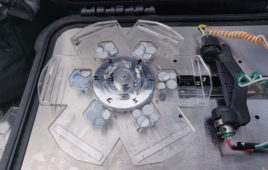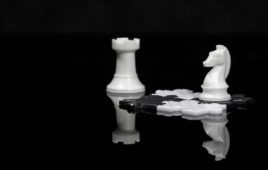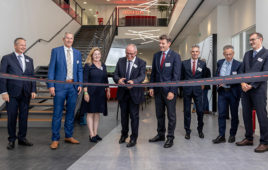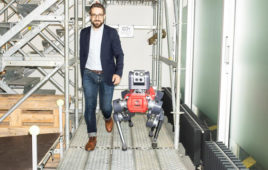To disinfect surfaces without taking risks, the Bataillon de Marins-Pompiers (marine fire service) from Marseille has equipped itself with two Colossus robots. These remote control and highly modular autonomous robots are proving to be valuable assets in the fight against Covid-19. Fitted with maxon motors, these versatile robots are also capable of supporting the unit in large-scale incidents. A report on an heroic collaboration.
A powerful, reliable and robust “Swiss knife” robot
This is not the first time that this robot has been talked about because of its pluckiness. Its services were already praised in April 2019, during the Notre-Dame fire. While the fire was threatening the integrity of the structure and the very life of the Paris firefighters, Colossus had enabled almost 3000 litres of water to be sprayed per minute onto the inside walls of the cathedral, without endangering a single human life. Today, with a global pandemic suddenly threatening everyone’s health, Colossus has once again been called in to help out.
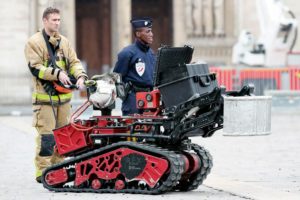 Developed by the French company Shark Robotics, in partnership with the Sapeurs-Pompiers de Paris (Paris firefighters) brigade, this robot has the advantage of being able to adapt to all kinds of dangerous situations, in a very operationally efficient manner. After proving its effectiveness on fire, Colossus is now being used to combat Covid-19, thanks to a decontamination module. Equipped with a 50 L tank, connected to nozzles that micro-spray disinfectant liquid, the robot is capable of disinfecting up to 20,000 m2 in three hours. If necessary, Colossus can be fitted with a smoke removal fan to facilitate access to an area on fire, or even with a motorised handling arm to grasp and move objects. It is this “Swiss knife” aspect that won over the Bataillon de Marins-Pompiers from Marseille, who acquired two Colossus robots in May 2020. Named Marius and César, in tribute to Marcel Pagnol, the machines are designed to support the unit on numerous assignments.
Developed by the French company Shark Robotics, in partnership with the Sapeurs-Pompiers de Paris (Paris firefighters) brigade, this robot has the advantage of being able to adapt to all kinds of dangerous situations, in a very operationally efficient manner. After proving its effectiveness on fire, Colossus is now being used to combat Covid-19, thanks to a decontamination module. Equipped with a 50 L tank, connected to nozzles that micro-spray disinfectant liquid, the robot is capable of disinfecting up to 20,000 m2 in three hours. If necessary, Colossus can be fitted with a smoke removal fan to facilitate access to an area on fire, or even with a motorised handling arm to grasp and move objects. It is this “Swiss knife” aspect that won over the Bataillon de Marins-Pompiers from Marseille, who acquired two Colossus robots in May 2020. Named Marius and César, in tribute to Marcel Pagnol, the machines are designed to support the unit on numerous assignments.
Curative disinfection and intervention in a hostile environment
Remotely operated by a fire officer, Marius and César can change modules as needed in less than 30 seconds without using any tools. Their multiple NRBC cameras and sensors allow them to carry out investigation missions, transport equipment using a pannier, or evacuate an injured person on a towed stretcher. It is also possible to add an HD camera to Colossus to observe the environment through 360 degrees, day and night, or to fit it with sensors dedicated to measuring precise parameters, such as temperature, radiation, or the presence of bacteriological agents.
Filed Under: maxon Driven

